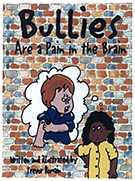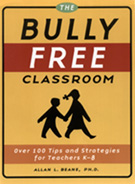No matter how old you are, everyone remembers the bully who taunted him or her in school. Although, some say that the experience made them stronger, others will disagree saying that being bullied in school is not a normal part of growing up. According to data from the National Association of School Psychologists (NASP), approximately one in seven school children is a bully or a victim of one, and 22 percent of fourth through eight-graders report academic difficulties caused by peer abuse. In addition, close to 160,000 students choose to stay home each day to avoid a bully. It can be beneficial for both students and teachers to recognize the signs of bullying and learn tactics to prevent it from happening.
What Kids Need to Know
“There is nothing natural about being bullied. It’s not okay to be hurt,” said Trevor Romain, author of Bullies Are a Pain in the Brain and Cliques, Phonies, & Other Baloney. Some of the advice that Romain gives to students who are victims of bullying include:
- Avoid a bully even if that means taking the long way home
- Allow your friends to support you by making sure that you are not left alone to be confronted by a bully
- Shout as loud as possible if a bully approaches you because most bullies dislike being noticed
- Do not let a bully see you cry. They will feel as though they have won
- Tell an adult
Many incidents of bullying go unreported because students don’t want to tattle.According to Romain, if a student reports a bully they will be helping other kids who also might be victims of bullying. By reporting incidents of bullying, other students are less likely to encounter the same treatment.
“Bullies are self-esteem vampires. They want to suck the self-esteem out of you,” said Romain, who believes that the one thing to never let a bully take away from you is your own self-esteem.
If you are being bullied Romain advises that you:
- Stick up for yourself. “The teasing doesn’t have anything to do with you; it’s just the bully’s need for power and control”.
- Don’t drop to your knees and whine. “Bullies love it when their victims beg for mercy.”
- Use your best judgment when threatened. “What if you and the bully who wants your money are the only two people in the hallway and you’re about to get beat up? Give her the money. Then tell an adult.”
Romain also reminds kids that people can actually bully themselves. By telling yourself “I’m stupid” or “I can’t do anything right,” you make yourself feel scared, sad and alone -- which, besides being a terrible waste of you, can also be a perfect way to attract the attention of bullies.
“The benefit of bringing bully problems out in the open is that the bully is no longer in control,” said Romain. “It won’t be as easy for him (or her) to pick on you or other students because everyone will have a better understanding of how to make the bully stop.”
By combining drawings with advice, Romain’s book cut to the chase about bullies by telling kids:
- You are not alone.
- It’s not your fault.
- There’s something you can do about it.
 How Teachers Can Help?
How Teachers Can Help?
In addition to educating students about ways to protect themselves, Allan L. Beane, Ph.D., author of The Bully Free Classroom, believes that educators can help to create a “bully free” environment for students. His book offers over 100 tips and strategies for teachers on how to create a positive classroom that promotes respect, empathy, cooperation and acceptance in kindergarten through eight grades. Suggested steps to curb bullying in the classroom include: find out how common it is in the school, set firm rules against bullying behavior, monitor areas where bullying usually takes place, such as the bathroom and cafeteria, discuss the effects of bullying with students, reinforce good behavior and report all incidents of bullying.
In his opinion, bullies can change their behavior, victims can learn ways to avoid being bullied and teachers and parents can help students learn to resolve conflicts effectively.
One of the main ways to prevent bullying is to teach respect. According to Beane, many adults focus on resolving the immediate incident, but to actually prevent bullying you have to focus on changing both behavior and attitude. By teaching respect for others, bullying is identified as unacceptable behavior.
What Can Parents Do?
Beane recommends that parents talk with their children regularly, get involved with their activities and know their friends. He also recommends ...
If parents suspect that their child is being bullied:
- Ask about it (children rarely volunteer this information). Try asking questions like “So, who’s the bully in your classroom?” “Who does the bully pick on most of the time?” “What does the bully say or do to you?” “How does that make you feel?”
If your child tells you he or she is being bullied:
- Believe your child. Ask for specifics and write them down.
- Don’t confront the bully or the bully’s parents. This might make matters worse.
- Don’t tell your child to “get in there and fight.” Your child could get hurt.
- Don’t blame your child. Bullying is never the victim’s fault.
- Don’t promise to keep the bullying a secret (thus giving the bully permission to bully).
- Tell your child you’re glad that he or she told you. Explain that you are going to help, and you’re also going to ask the teacher to help.
- Request a private meeting with the teacher as soon as possible. Other than your child, no student should know of this parent/teacher meeting. Ask for the teacher’s perspective (he or she might know things about bullying that you don’t). Ask to see a copy of the school’s anti-bullying policy. Stay calm and respectful; your child’s teacher wants to help.
If your child’s teacher has told you that your child is bullying others, take it seriously.
- Talk with your child. Your child might try to deny or minimize the behavior; this is normal.
- Don’t blame; don’t ask “why” something happened or “why” your child acted in a certain way. This may lead to lies and excuses. Stay calm. Make it clear that bullying is NOT okay with you.
- Talk with your child about how bullying affects the victim. If you remember times from your own childhood when you were bullied, share how it made you feel.
- Praise your child’s efforts to change. Notice when they follow the rules and give positive feedback when child does something kind or thoughtful for others.
- Reassure your child that you still love him or her. It’s the bullying behavior you don’t like.
Resources
The above materials are available from Free Spirit Publishing, which specializes in Self-Help for Kids® and Self-Help for Teens®.
Free Spirit Publishing
400 First Avenue North, Suite 616, Minneapolis, MN 55401-1724
612.338.2068, help4kids@freespirit.com

